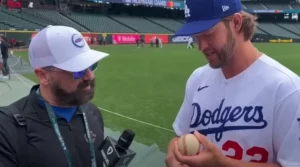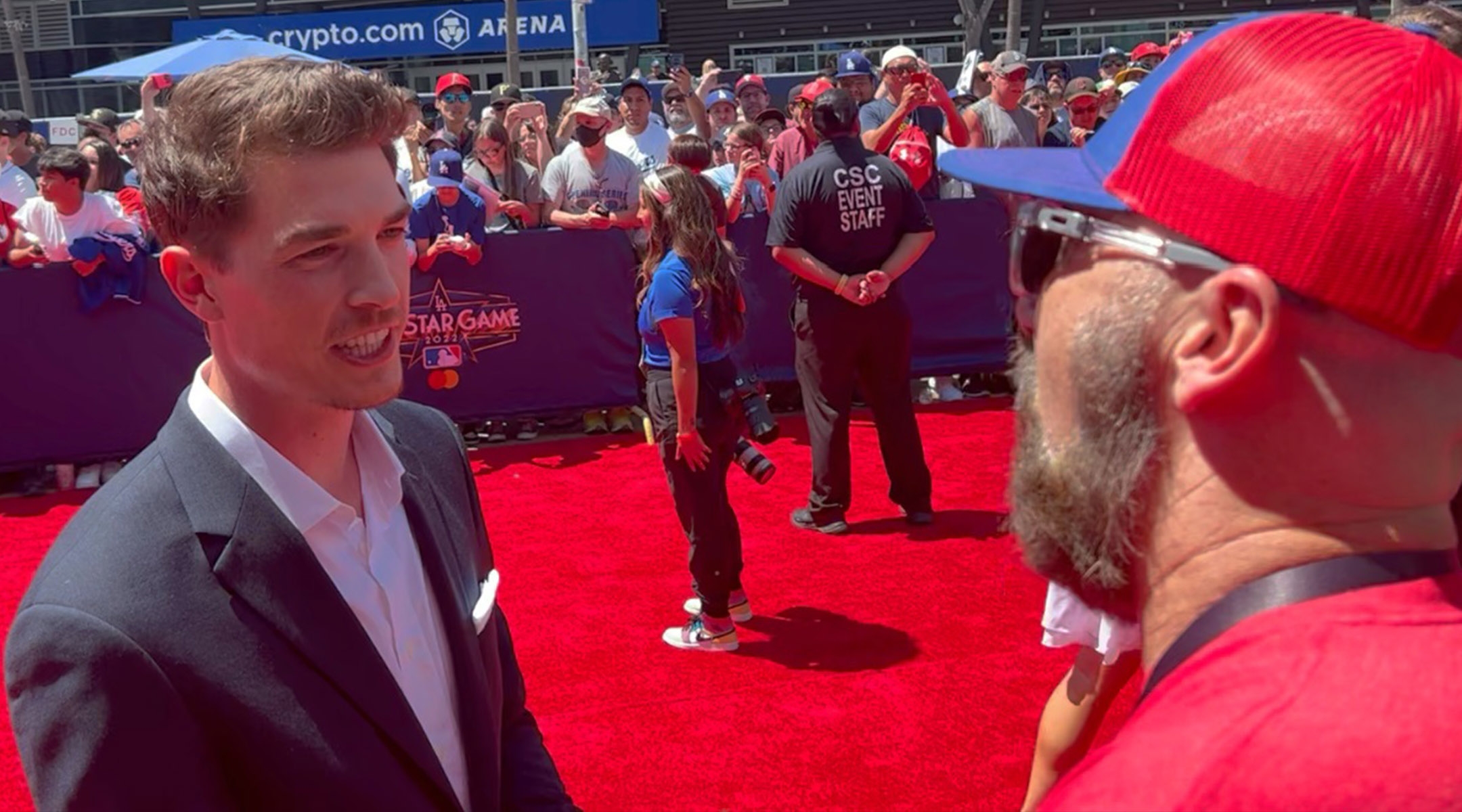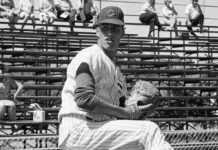
Jacob Gurvis
It’s safe to say that few people watch more baseball than Rob Friedman.
During the MLB season — which features 30 teams playing 162 games each from April through October — Friedman spends countless hours every day watching as much of the sport as he can from the comfort of a four-screen media center he set up in his home outside Atlanta.
His particular area of expertise is pitching — a complex, crucial and, he believes, underappreciated aspect of the game. His dissection of individual pitches, posted on social media, has made him an authority on the craft.
For nine years, posting as the “Pitching Ninja,” he has built a following of more than a million users across social media platforms. He highlights impressive performances from the mound and has gone on to work as an analyst on multiple TV networks as well as MLB’s own channels. Big league players have been spotted wearing his merchandise — with its recognizable logo of a baseball dressed as a ninja — and learning from his videos.
Dozens of times a day, on the platform popularly known as Twitter, Friedman shares pitching GIFs and edited videos of pitchers throwing multiple pitches, overlaid on top of each other to illustrate their variety. He also has a daily segment where he breaks down his “filthiest” pitches of the day, highlighting sliders, changeups or fastballs that he calls “nasty” or “dirty” — adjectives that all count as high praise in the baseball world.
How did Friedman, a lawyer by trade with only scant amateur baseball experience, become one of the most popular personalities in the sport?
“I have no idea,” he recently told the Jewish Telegraphic Agency.
Friedman, 56, grew up in a Conservative Jewish family on Long Island, had a bar mitzvah and attended Hebrew school, where he fondly recalls melting crayons on the heater in his classroom.
And although he was born the same year Sandy Koufax retired, Friedman was a big fan of the Jewish Dodgers pitcher, saying that he has always admired “the way he carried himself his entire career.”
Friedman played baseball on and off through college But he said it wasn’t until he coached his son Jack that he discovered his love for the sport.
“That really made me love baseball even more, teaching it to somebody and having to learn the ins and outs of the game,” Friedman said.
As a coach, Friedman took a particular interest in pitching. He asked a lot of questions — a curiosity he attributed to his training as an attorney — and began to learn everything he could about the craft.
“It gave me a whole new appreciation for it, and also a way to break down mechanics and really kind of teach what actually pitchers do, as opposed to what coaches say they do,” said Friedman. “I think that was the fun part, delving deep into it.”
He began posting about the finer points of pitching on online message boards around 2007. In 2014, he started tweeting.
“I wanted to share this because not everybody is fanatical like I am,” Friedman said. “So I shared the stuff that I had and just kept getting more and more, a bigger, bigger following, MLB pitchers would start following it, too and asking questions. And it just blew up.”
Before he knew it, Friedman had become the “Pitching Ninja,” a name inspired by his family. Friedman’s wife is half-Japanese, and his son was once told he looked like one of the stealthy Japanese warriors when he wore a bandana while pitching. His son didn’t love the name, so Friedman happily adopted it for himself.
“After a while it was like, you know what, I want to be known as ‘Pitching Ninja’ versus ‘internet geolocation dude,’ which was my company that I started, or ‘lawyer dude,’” said Friedman, who co-founded the tech firm Digital Envoy. “I figured it was a better way to spread the love of something in the world. And a good use of social media, because [I’m] generally staying positive on stuff and showing people that social media can be good.”
Fellow baseball analysts have noticed. Jake Mintz, a baseball writer and podcaster who makes up half of the duo behind “Cespedes Family BBQ,” a popular baseball podcast and social media presence, said he first became aware of Friedman’s work back in 2016 or 2017.
“It doesn’t take too much baseball knowledge to understand why what he’s tweeting is awesome,” Mintz told JTA. “Him doing an interview on YouTube with a pitcher is a higher-level thing, obviously. And that is interesting for people who are super into the game. But just for a casual fan, him providing a light-hearted perspective on pitching is incredibly relatable.”
Friedman is part of a group of Jewish baseball experts who have gained a following online. Mintz, who is also Jewish, collaborated with Friedman in 2019 on a baseball show called “Changeup,” where they would break down the top pitches of the week. He said Friedman is “an incredibly nice fella.”
Friedman recalled running into Mintz and his Jewish podcasting partner Jordan Shusterman at this year’s All-Star Game, along with Alex Fast, another Jewish baseball content creator. He said he’s also in touch with Jewish ESPN reporter Jeff Passan from time to time.
“There’s a camaraderie when you realize, yeah, there are guys that I didn’t know were Jewish that are, and like, ‘Oh, this is cool,’” Friedman said. “Like we talk about bar mitzvahs and stuff like that.”
Friedman also said he enjoys seeing and sharing highlights from Jewish pitchers like Max Fried, Dean Kremer and Scott Effross.
“I don’t highlight them extra-special, but I’m like, hey, it’s cool to see these guys succeed and to be carrying on the Jewish brand in baseball,” he said.

Rob Friedman, right, with Jewish pitcher Max Fried at the 2022 MLB All-Star Weekend red carpet event in Los Angeles. (Courtesy of Rob Friedman via JTA.org)
Friedman said the current slate of Jewish talent in the major leagues — 18 Jewish players have appeared this season — is an important step toward better representation.
“There were not a lot of Jews playing when I was growing up,” Friedman said. “As a Jewish kid, you always look for somebody because everybody tells you, ‘You should be a lawyer or a doctor,’ or something like that. And seeing somebody succeed definitely gives you a connection to them. I think seeing more Jews in baseball brings more Jews to baseball.”
Though Friedman isn’t a player himself, Mintz said he’s part of the elevated Jewish presence in the game today.
“The thing with him being Jewish is, my guy’s name is Rob Friedman,” Mintz said with a laugh. “He’s carrying that in a way that is unavoidable for him. Just by existing in the baseball internet with the name Rob Friedman makes him a visible Jew in that world.”
Mintz added that there is one thing that sets Friedman apart from most content creators in the sport: his popularity among players.
“You go into any clubhouse on any given day, and you’re gonna see people wearing the [‘Pitching Ninja’] shirt in the colors of their team,” Mintz said. “And that’s just because in a way, he’s kind of like a central clearinghouse, like a town hall meeting room for pitchers.”
Friedman said he is frequently in touch with MLB pitchers — and has even helped them improve their game.
“I’m lucky enough to have pitchers that follow me, major league guys that learn pitch grips from my account, which is fantastic,” Friedman said. “I’m always excited when I hear stuff like, a guy picked up somebody else’s grip because I interviewed the pitcher.”
Friedman said one key reason that pitchers follow him is that a lot of mainstream baseball coverage places an emphasis on hitting, since a 400-foot home run can be flashier to a casual fan than a whizzing curveball on the inside corner.
“Everybody always focuses on that aspect of the game, not as much on the pitching,” Friedman said. “So [pitchers] view it as their chance to shine. And they love it when they get featured.”
Friedman said Collin McHugh, a veteran pitcher on the Atlanta Braves, once called his account the “ESPN Top 10 for pitchers” because, Friedman recalls him saying, whenever he’s featured on a highlight reel of top plays on “SportsCenter,” “it’s always because I screwed up.”
As his profile rises among players and fans, Friedman said he remains grateful that he gets to spend his days watching, writing and talking about baseball.
“There are days I wake up and I’m like, how the heck did I get that lucky to do this?” he said. “This is so cool.”






